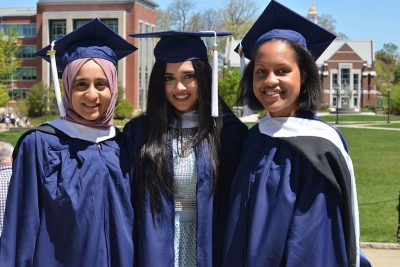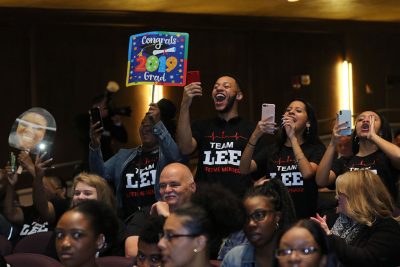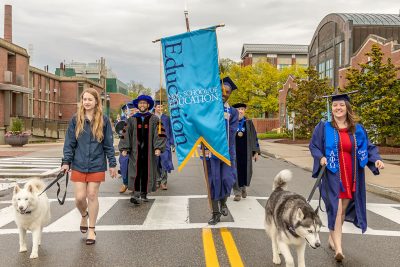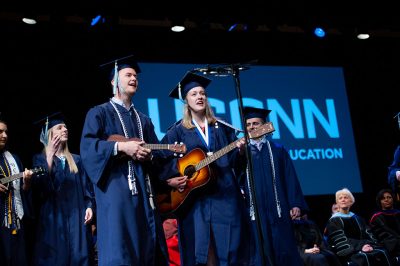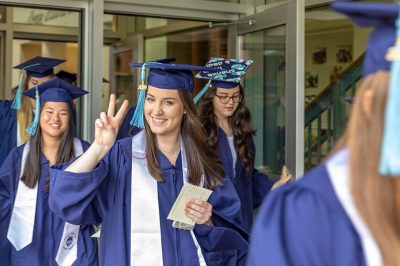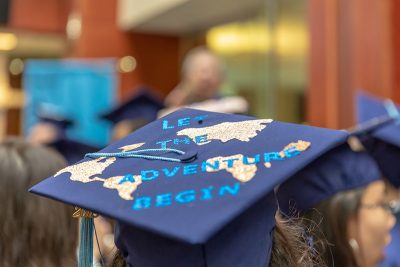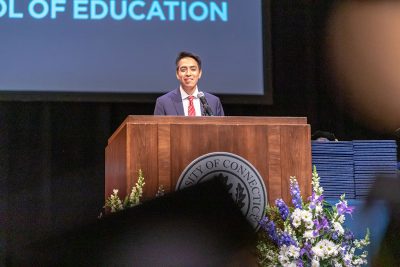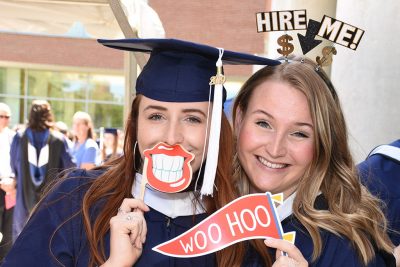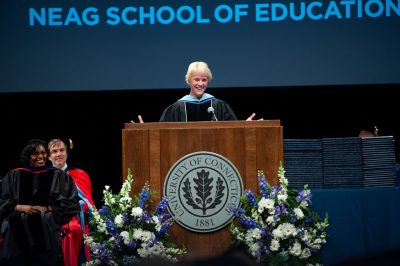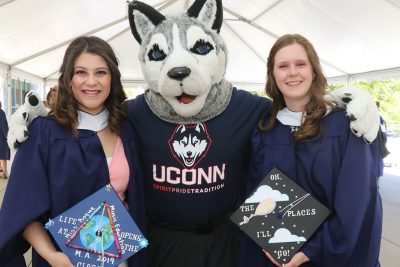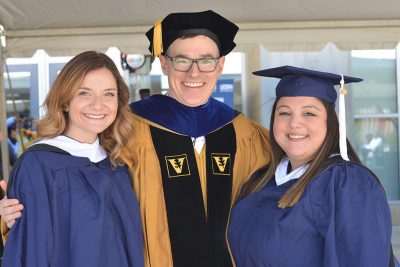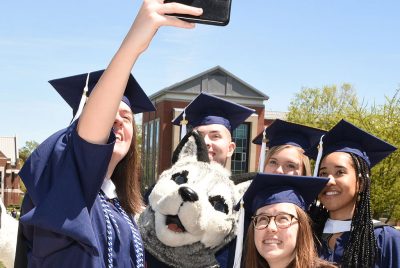Collaboratory on School and Child Health (Lisa Sanetti, steering committee member for CSCH, interviews colleagues on pain research)
Neag School Accolades: April – May 2019
Congratulations to our Neag School alumni, faculty, staff, and students on their continued accomplishments inside and outside the classroom. If you have an accolade to share, we want to hear from you! Please send any news items and story ideas to neag-communications@uconn.edu.
In addition to the Dean’s Office and Department achievements, explore this edition’s list of Accolades for the following: Faculty/Staff; Alumni; Students, as well as In Memoriam.
Dean’s Office and Departments
The Neag School celebrated the Class of 2019 during Commencement Weekend, May 11-13, on the UConn Storrs campus. Read more about the celebration — and check out videos featuring a special performance by music education majors as well as local schoolchildren thanking their student teachers, plus photos from the Undergraduate procession, featuring Jonathans XIII and XIV, the Undergraduate ceremony, the receptions for undergraduate and master’s/6th-Year students, and fun poses from our photo booth.
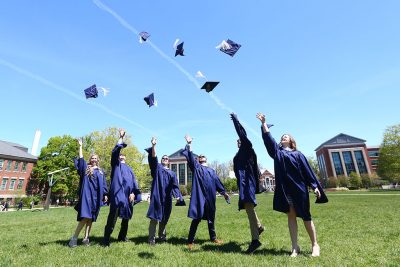

The Neag School participated in the second-annual UConn Giving Day, with the Department of Educational Psychology “Think About the Link: Resources for Schools” project comingin second place University-wide. The 36-hour effort raised more than $22,000 in support of the Neag School’s four projects, with more than 400 gifts from faculty, staff, students, alumni, and friends. Read more about the Neag School’s 2019 Giving Day results.
During its May faculty/staff meeting, the Neag School recognized Scott Brown for his service as department head for Educational Psychology, Michael Coyne for his appointment as the incoming department head for Educational Psychology; and René Roselle for her service as interim director of Teacher Education, as well as four retirees for their years of service to UConn: Mary Anne Doyle (35 Years), Tom DeFranco (28 years); Don Leu (19 years); and George Sugai (14 years). At the meeting, Dean Gladis Kersaint also congratulated seven Neag School faculty members on their promotion to the rank of Associate Professor: Gerardo Blanco, Joseph Cooper, Jennie Weiner, Jennifer Freeman, Devin Kearns, Tamika La Salle, and Richard Gonzales (Associate Professor in Residence).
In addition, the following individuals were recognized for their years of service:
- 10 Years of Service: Morgaen Donaldson (EDLR); Justin Evanovich (EDLR); Natalie Olinghouse (EPSY); Barbara Sousa (Dean’s Office)
- 15 Years of Service: Casey Cobb (EDLR); Rebecca Eckert (EDCI); Alan Marcus (EDCI); René Roselle (EDCI)
- 20 Years of Service: Melissa Bray (ESPY); David Moss (EDCI); Del Siegle (Dean’s Office); Jaci VanHeest (EPSY)
- 25 Years of Service: Siamak Vahidi (EPSY)
- 30 Years of Service: Sally Reis (EPSY)
- 35 Years of Service: Jeffrey Crouse (Dean’s Office)
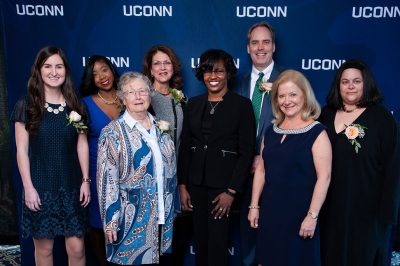
The Neag School also recently awarded the 2019-20 Neag School Dean’s Research Incentive Awards:
- Jennie Weiner (PI, EDLR) – “Investigating the Relationship Between Organizational Conditions and Effective Technology Integration in Schools”; Co-PI: Christopher Rhoads (EPSY)
- Clewiston D. Challenger (PI, EPSY) – “A Curriculum Design and Development for a Proposed Psychoeducational Group, Dr. Challenger’s College Transition Program for Student-Athletes (CTPSA): A College Readiness Program for High School Athletes”; Co-PIs: Joseph Cooper (EDLR) and Erik M. Hines (EPSY)
- Danielle Filipiak (PI, EDCI) – “Finding My Way: Tracing the Teaching Experiences of Early-Career, Women of Color Through an Intergenerational, Critical Ethnographic Coalition”; Co-PIs: Grace. D. Player (EDCI), Dominique Battle-Lawson, and Mia Hines.
The Dean’s Research Incentive Award is a competitive grant program intended to fund seed research projects (up to $10,000) that facilitate acquisition of external funding and utilize interdisciplinary or cross-disciplinary teams with a Neag School principal investigator as lead researcher. This year’s review panel included Hannah Dostal, Brandi Simonsen, D. Betsy McCoach, Daniel Stolzenberg, and Morgaen Donaldson.
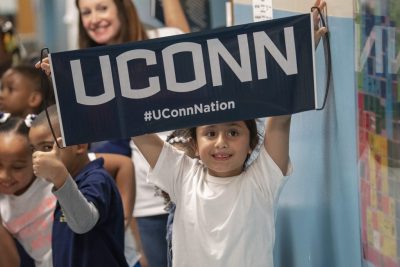
The Neag School of Education’s Office of Alumni Relations visited partner school E.B. Kennelly in Hartford, Conn., to attend “UConn Day,” which included a schoolwide celebration, parade, and basketball game with students versus teachers.Kennelly students are impacted by the Neag School juniors, senior student teachers, and master-year interns who work closely with them through intervention groups, tutoring, service-learning projects, and student leadership opportunities. Check out photos on UConn Today from Kennelly School’s UConn Day.
The Neag School’s Office of Alumni Relations also hosted a Career Panel and Networking event in March in West Hartford, Conn. Featured panelists included Nancy Williams, senior talent recruiter, Hartford (Conn.) Public Schools; Terrell Hill, assistant superintendent for human resources, Windsor (Conn.) Public Schools; Kate Lund ’06 (ED), ’07 MA, ’12 6thYear, supervisor of secondary English and library and media studies, Glastonbury (Conn.) Public Schools; and Tayarisha Stone ’17 Ed.D., principal, Sara J. Rawson Elementary School in Hartford, Conn.
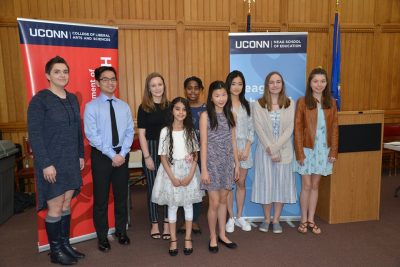
The Neag School, the UConn Department of English, and the Connecticut Writing Project recognized Connecticut’s winners of the 26th annual Letters About Literature competition at a special ceremony at the Capitol in Hartford, Conn., last month. Doug Kaufman and alum Jason Courtmanche ’91 (CLAS), Ph.D. ’06 served as faculty advisors for the competition. The nationwide contest is sponsored by the Library of Congress for students in grades 4 through 12. The Neag School served as a co-sponsor of the contest for the state for the fourth consecutive year. Students from the Neag School served as judges for the Connecticut students’ contest submissions. Check out the story and photos from this year’s Letters About Literature recognition event.
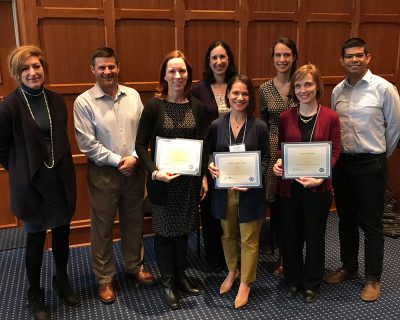
Three individuals from the Neag School — Jennifer McGarry, Milagros Castillo-Montoya, and a doctoral student Patricia O’Rourke —were finalists for the UConn’s inaugural President’s Award for Excellence in Dialogue and Civility. The award honors those at UConn who work to initiate new ideas and points of view in speaking about difficult topics in a welcoming way.
Department of Curriculum and Instruction (EDCI) and Teacher Education
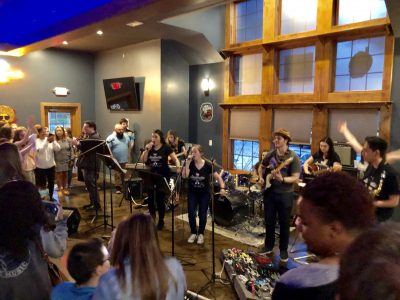
Thomas DeFranco is retiring on June 1 after serving at UConn for nearly 28 years. During his time at the Neag School, and with a joint appointment in the College of Liberal Arts and Sciences, he has served in many leadership roles, including as a former dean of the Neag School.
EDCI faculty, staff, and music education students performed as The Vygotskys, featuring the Notorious ZPD, at the Hop Knot restaurant in Storrs, Conn., this month. The concert also featured a performance by Neag School music education students. Check out photos from the Hop Knot event.
Michele Femc-Bagwell has been named director of the Neag School’s Teacher Education program, effective Aug. 23.
Teacher Education hosted a “Preparing for the Career Fair” workshop in March, where Neag School alumni from local school districts discussed strategies for getting the most out of the career fair, what to expect, and how to research school districts. Check out photos from the workshop. In addition, Teacher Education welcomed participants from 68 school districts from across the state for the annual Education Career Fair in April at the Storrs campus. In addition to connecting with recruiters, roughly 200 graduating teacher education students had the opportunity to interview with school district representatives for positions in teaching, counseling, and school psychology. Check out photos from the Spring 2019 Career Fair.
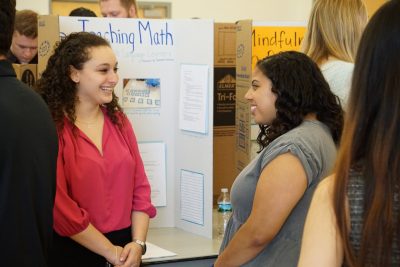
Teacher Education held its 2019 IB/M Master’s Day of Research in May, at which master’s students in the Integrated Bachelor’s/Master’s program presented their inquiry projects from this past academic year during a poster session. Check out photos from the Day of Research.
Teacher Education co-sponsored a film screening of “East LA Interchange,” which included a discussion with filmmaker Betsy Kalin at the Spotlight Theatres in Hartford, Conn., in April.
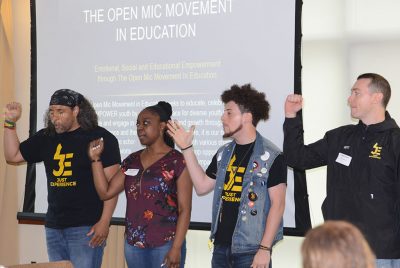
Teacher Education hosted the annual Partner Summit, consisting of bringing Neag School faculty together with school-based teacher educators. The day included a discussion, led by Leadership in Diversity (L.I.D.) students, on cultivating a more diverse teaching force; a working discussion on meeting the needs of pre-service teachers of color; and a special presentation by Just Experience, a grassroots startup company that strives to educate, entertain, and empower communities across the world. Check out photos from the Partner Summit.
Department of Educational Leadership (EDLR)
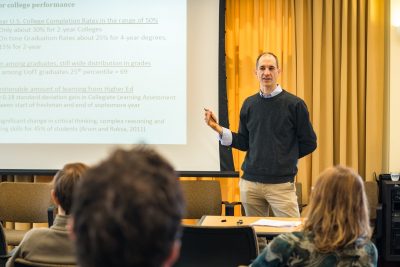
The Center for Education Policy Analysis (CEPA) 2018-19 Speaker Series featured two events in April, including Philip Oreopoulos from the University of Toronto, who presented “The Remarkable Unresponsiveness to Nudging College Students and What We Can Learn from It” and Caroline Hoxby from Stanford University, who presented “The Productivity of Education in Early Adolescence: A Neuroscience-Based Hypothesis and an Intervention.” Both events were co-sponsored by the UConn Department of Economics. CEPA also hosted a speaker event in March, featuring Preston Green who presented “Are We Heading for a Charter School ‘Bubble?’: Lessons from the Subprime Mortgage Crisis.” Learn more, and check out photos from past CEPA Speaker Series events.
The Department of Educational Leadership was a sponsor of El Instituto’s talk, “(Re)Claiming Voices and Sharing Stories: Contesting Power, Privilege, and Silence in the Classroom,” held in April at the Puerto Rican and Latin American Cultural Center on the Storrs campus. Neag School faculty members Milagros Castillo-Montoya and Erica Fernández are members of the El Foco leadership team, which helped organize the event. Check out photos from the El Foco talk.
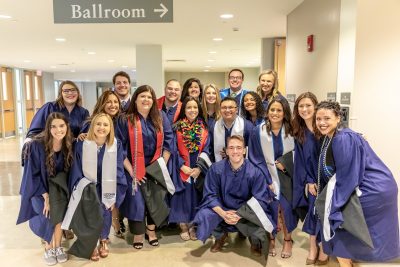
The Higher Education and Student Affairs program (HESA) hosted a graduation celebration as part of Commencement Weekend on the Storrs campus in May. Check out photos from the HESA graduation celebration. HESA Assessment Day was also held in May, when first-year HESA students presented results of their assessment projects. Last month, HESA hosted an ice-cream social for Graduate Student Appreciation Day on the Storrs campus for students and campus partners from the program. Check out photos from HESA’s Graduate Student Appreciation Day event.
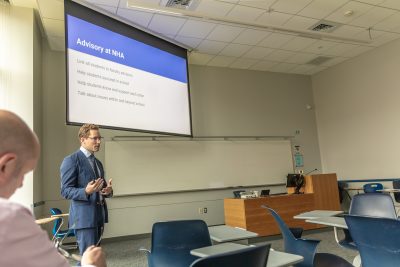
The University of Connecticut Administrator Preparation Program (UCAPP) hosted its annual Change Project Day on the UConn Storrs campus in April. The event features students presenting their capstone assignments, in which they identify a need or opportunity for school improvement and work toward positive change. Check out photos from the Change Project Day, and read more about one UCAPP change project focused on building a sense of belonging among students at a magnet school in New Haven, Conn.
Department of Educational Psychology (EPSY)
The Center for Behavioral Education and Research (CBER) hosted its April Breakfast Brown Bag Series, “Using Implementation Science to Improve Research and Practice in K-12 Schools,” on the Storrs campus. The event featured Neag School faculty members Lisa Sanetti and Bianca Montrosse-Moorehead, and Alicia Dugan from UConn Health. View photos from the Breakfast Brown Bag. CBER also hosted its ninth annual CBER Graduate Research Symposium at the UConn Storrs campus earlier this month. The symposium included a researcher panel and a poster session featuring graduate students’ research. Doctoral student Tori Whaley won the competition for best poster. Check out photos from the Graduate Research Symposium. In addition, later this month, CBER hosted the Northeast PBIS Network Leadership Forum in Groton, Conn.
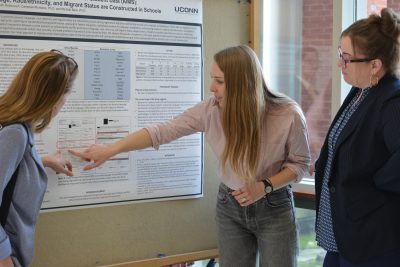
Michael Coyne has been named head of the Department of Educational Psychology; Board of Trustees Distinguished Professor Scott Brown steps down from the position in June.
ScHOLA²RS House, led by faculty advisor Erik Hines, hosted its year-end banquet on the Storrs campus in April to recognize its students’ accomplishments. In addition, earlier this spring, ScHOLA2RS House hosted a Black History Month networking night. Read about two alumni who attended the networking event in the Neag School’s latest installment of 10 Questions.
George Sugai retired May 1 after serving at UConn for nearly 14 years. An expert in PBIS, special education and other areas, he secured more than 20 funded projects, totaling tens of millions of dollars over the course of his tenure at UConn.
The eighth annual Teaching and Learning With iPads Conference was held this month on the UConn Storrs campus. View photos from the iPads Conference.
Research by the National Center for Research on Gifted Education was featured in The Hechinger Report, including quotes from Betsy McCoach, and mentioned in Education Week, with additional quotes from McCoach as well as postdoc Rashea Hamilton.
Faculty/Staff
Dorothea Anagnostopoulos has been named vice president of the American Educational Research Association (AERA)’s Division K, Teaching and Teacher Education for 2019-20.
Ronald Beghetto co-authored “Toward Dynamizing the Measurement of Creative Confidence Beliefs” for the May issue of Psychology of Aesthetics, Creativity, and the Arts.
Aarti Bellara spoke at the Badar-Kauffman Conferencein Kent, Ohio, in April.
Melissa Bray co-published with Thomas Kehle, along with others, “Japanese Educational Reforms and Initiatives as They Related to School Psychological Practice” for the April issue of the International Journal of School and Educational Psychology.
Laura Burton was a speaker at the 2019 Women’s Frozen Four Women’s Coaches Symposium at Quinnipiac University in Hamden, Conn., in March.
Rebecca A. Campbell-Montalvo gave a roundtable presentation on “The Importance of Language Representation as School Employees Broker Health Care for Multiply-Minoritized Migrant Families” at Georgetown University in Washington, D.C., in March. She was also a co-presented for a podcast on “Applying Anthropology in Education: Addressing Equity From K-College” for the Society for Applied Anthropology in March.
Tutita Casa co-authored “An Analysis of the Amount and Characteristics of Writing Prompts in Grade 3 Mathematics Student Books” for the February issue of School Science and Mathematics.
Milagros Castillo-Montoya was awarded a $37,600 grant to engage in the People in the Reform Initiative, launched by Strong Start to Finish and supported by the nonprofit Education Commission of the States. The initiative focuses on highlighting the work being done by faculty involved in educational reform at their colleges to support first-generation students, students of color, and returning adult students. Doctoral students Jillian Ives and Joshua Abreu will work with her on this initiative. Castillo-Montoya also co-wrote “Learning Within Teaching: Insights Faculty Gain from Their Interactions With Students Around Subject Matter” and “Community College English Instructors’ Perceptions of Learning and Enacting Culturally-Sustaining Teaching Strategies” for the March issue of Journal on Excellence in College Teaching. In March, she was a guest speaker on “Rigor Revisited: Scaffolding College Student Learning by Incorporating Their Lived Experiences” at the University of Denver. In March, she and Danielle DeRosa co-presented “Expanding Student Affairs’ Professional Preparation to Include Intergroup Dialogue” at the College Student Educators International (ACPA) Annual Convention in Boston. The EDLR website also featured their course, EDLR 5105, in its “Courses and Curriculum Series” in March.
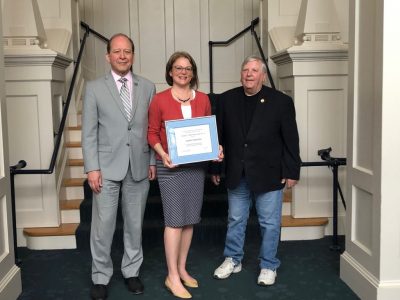
Board of Trustees Distinguished Professor Sandra Chafouleas received the 2019 Edward C. Marth Mentorship Award, established by the UConn chapter of the American Association of University Professors (AAUP) to recognize the leadership and dedication of the UConn-AAUP’s former executive director Ed Marth. The award honors UConn graduate faculty members for their outstanding commitment to mentoring graduate students over the course of their careers. Read more about the Marth Award announcement on UConn Today. In addition, Chafouleas served as the 2019 UConn Graduate School’s Commencement speaker. She is also taking over as the book series editor at Guilford Press and has published two books in the series, with a second edition of her behavior assessment book to be completed this summer.
Joseph Cooper was recognized by the UConn NAACP chapter with the Faculty Lifetime Achievement award. He received the award during the UConn NAACP Image Awards ceremony on the UConn Storrs campus in March.
Michael Coyne’s project on early reading intervention was one of the proposed Institute of Education Service (IES) projects selected for replication due to its strong evidence of impact.
Morgaen Donaldson co-presented “Does Principal Evaluation Increase Principals’ Capacity” and “Trends in State Evaluation Policies” at the annual conference for the American Education Finance and Policy, in Kansas City, Mo., in March.
Danielle Filipiak, a member of the National Council of Teachers of English (NCTE) standing committee on global citizenship, wrote an article titled “An Equitable English Education Begins with Dignity” for the NCTE’s blog.
Preston Green was a featured panelist at the National Symposium to Mark the 65th Anniversary of Brown v. Board Education at Penn State in May in University Park, Pa.
Elizabeth Howard co-published “The Challenges of Recruiting and Retaining Dual Language Teachers,” a chapter in Dual Language Education: Teaching and Leading in Two Languages (Springer, 2019).
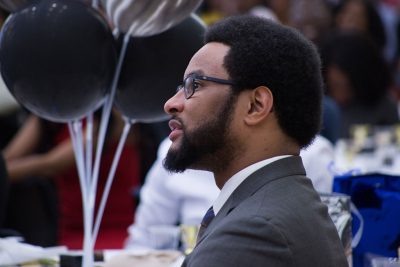
James Kaufman was featured in a podcast episode on creativity, published an article titled “Self-Assessments of Creativity: Not Ideal, But Better Than You Think” for the May issue of Psychology of Aesthetics, Creativity, and the Arts, and was profiled by Rice Magazine.
Allison Lombardi spoke on universal design for instruction at the “Teaching and Designing for Diverse Learners” conference at the University of Waterloo in Waterloo, Canada, in May. She also is presenting this month in Boston at the 31st annual Postsecondary Disability Training Institute.
Joseph Madaus, Allison Lombardi, and alum Adam Lalor ’17 Ph.D., along with other colleagues, co-authored “Learning Strategy Instruction for College Students with Disabilities: A Systematic Review of the Literature” for the April issue of Journal of Postsecondary Education and Disability.
Alan Marcus is a recipient of a Spencer Foundation grant for his work on Holocaust-focused education research. The project, titled “The Forever Project: The Benefits and Dilemmas of Using Virtual Interactive Holocaust Survivor Testimony,” includes Ian McGregor, a Ph.D. student in curriculum and instruction; Rotem Maor, a postdoctoral student in curriculum and instruction; as well as faculty from the University of Wisconsin-Madison, Virginia Tech, and the University of Nottingham. The project is in partnership with the UK National Holocaust Centre in England and will focus on understanding the potential benefits, limitations, and dilemmas of using virtual interactive Holocaust survivor testimony as a means to support Holocaust education, and more broadly, human rights education. In addition, Marcus served as lead faculty marshal for the Neag School’s 2019 Undergraduate Commencement ceremony.
Jennifer McGarry was recognized by the North American Society for Sport Management (NASSM) with the Earle F. Zeifler award, the NASSM’s most prestigious award, which recognizes significant contributions to the field in terms of scholarship, research, leadership, and peer recognition. McGarry and Justin Evanovich were also profiled on the EDLR website about their partnership with Husky Sport.
Bianca Montrosse-Moorhead co-published, along with Tamika La Salle, Jennie Weiner, Hannah Dostal, and former colleague Shaun Dougherty, “The Overall and Differential Effects of a Targeted Prekindergarten Program: Evidence from Connecticut” for the third-quarter 2019 issue of Early Childhood Research Quarterly.
H. Kenny Nienhusser joined the board of Adelante Student Voices, a youth-driven organization whose focus is the success of the undocu/DACAmented community in rural New York state.
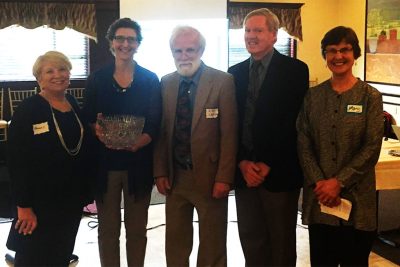
James O’Neil co-authored two articles, “Black Fathers Matter: The Role of Paternal Closeness on Adolescent Male Obesity”and “The Mediation Effect Between Everyday Discrimination, Gender Role Conflict, Emotional Eating, and Obesity in African American Fathers and Sons,” for the January issue of Psychology of Men and Masculinities.
Grace Player was a panelist for a discussion centered on what it is like to come from a mixed heritage. The event, hosted by UConn’s Asian American Cultural Center and the Puerto Rican/Latin American Cultural Center, was held at the Storrs campus in April.
John Settlage co-authored “Epistemic Tools for Science Classrooms: The Continual Need to Accommodate and Adapt” for the March issue of Science Education.
Brandi Simonsen was featured by UConnToday in a Q&A about the use of restraint and seclusion and whether the federal government has a role to play in regulating their use in public schools.
Megan Staples was recognized by the Connecticut Council of Leaders of Mathematics (CCLM) with the Betsy Carter Memorial Award. The award was given to her at an event in May in Cromwell, Conn., where she also gave a keynote, “What’s Next for Math Education? Broadening the Conversation to Math for Citizenship.” Mary Truxaw, who serves on the CCLM board, introduced Staples at the event.
Kari Taylor co-presented “Navigating the Writing and Publishing Process as a Graduate Student” at the College Student Educators International (ACPA) Annual Convention in Boston in March. She also co-published “Examining the Role of Discomfort in Collegiate Learning and Development” for the 2019 issue of the Journal of College Student Development.
Suzanne Wilson discussed her work, along with a colleague, on the forthcoming National Assessment of Educational Progress Mathematics Assessment Framework project on a Math Ed podcast episode last month.
Sarah Woulfin presented “The Spector of Evaluation” at Boston University’s Wheelock College of Education and Human Development in Boston in May. In April, she was recognized as the 2019 Emerging Scholar by the AERA Educational Change Special Interest Group. She also received a Research Excellence Program (REP) grant from UConn Health for her project entitled “Special But (in)Equal: A Qualitative Study of Special Education Teachers’ Work.”
Students
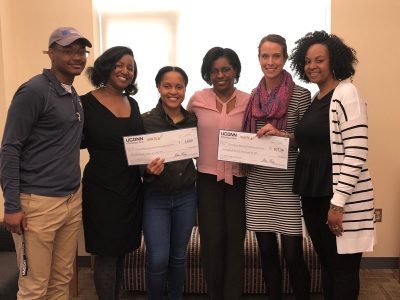
Neag School student groups Husky Sport and Leadership in Diversity (L.I.D.) combined efforts to win the annual UConn Foundation’s Ignite Campaign, with 308 donations. The combined group are back-to-back champs, raising a total of $22,113 with 573 donors over past two years.
Sport management students hosted a “Beyond the Field”event titled “Breaking Glass: How Women Fearlessly Navigate the Sport Industry,” featuring a panel of female leaders in sport, including Mary Ellen Gillespie, director of athletics with the University of Hartford; Beth Goetz, chief operating officer and senior woman administrator with UConn Athletics; and Alaina DiGiorgio, director of diversity and inclusion at the College of Our Lady of the Elms. The event took place at UConn Storrs in April.
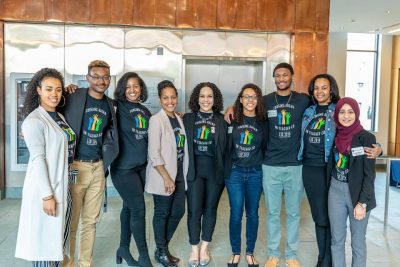
Teacher Education’s Leadership in Diversity (L.I.D.) student group held its third annual Reimagining Education Conference on the UConn Storrs campus in March. The event was organized by the student-led organization, which aims to help maintain success among students of color as they pursue careers in the field of education. Check out photos from the L.I.D. Conference.
World language master’s degree students from IB/M and TCPCG presented at the annual CCSU Conference for Language Teachers. Hannah Mikesell (French language education) and Alexandra Leonelli (Spanish language education) presented with their cooperating teachers on their inquiry projects. Several students were also inducted into the Connecticut Council on Language Teacher’s Future Language Teachers Honor Society.
Doctoral student Kevin Agnello presented “Measuring Teacher Stress: Development and Validation of a Contemporary Teacher Stress Scale” at an AERA Annual Meeting Roundtable session in Toronto in April with Aarti Bellara.
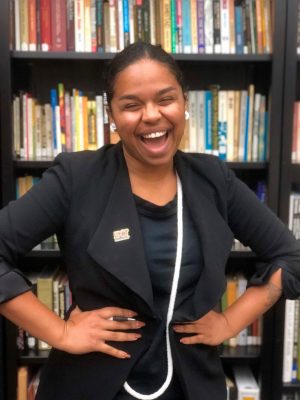
Pauline Batista, a second-year doctoral student in educational leadership, was recognized with the Graduate Student of the Year Award from UConn’s NCAAP Youth and College Chapter. The honor recognizes strong character, commitment, and academic achievements toward UConn students and the community.
Dakota Cintron, a doctoral student in Research Methods, Measurement, and Evaluation and a Dean’s Doctoral Scholar, has been selected as a Gulliksen Research Fellow for Educational Testing Service (ETS). During the academic year, he will be engaged in research under the supervision of his academic advisor, D. Betsy McCoach. He will also participate in the Summer Internship Program in Research for Graduate Students at the ETS offices in Princeton, N.J.
Jesús Cortés-Sanchez ’18 (ED, SFA), ’19 MA was featured in a recent UConn 360 podcast (4:28-15:49) and on UConn Today, talking about his Neag School experience and his work with the Grammy Award-winning album “American Dreamers.” Cortés-Sanchez was also the alumni speaker at the 2019 Undergraduate Commencement eeremony.
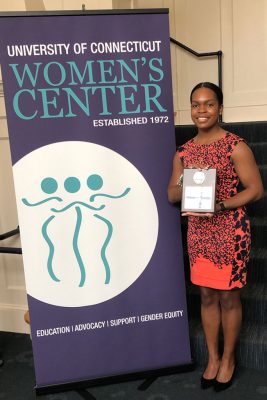
Autumnsarah Foster-Pagett, a student manager for UConn women’s basketball and a leader in various campus organizations, was recognized as a UConn 2019 Outstanding Senior Women Academic Achievement Award recipient. She received the award at a ceremony on the Storrs campus in May.
Kathrine Grant, a senior in English education, was recognized by UConn’s Early College Experience program with the Award for Outstanding Research in the Field of Concurrent Enrollment. She also was featured in UConn Today’s Commencement coverage for the Class of 2019. Other Neag School students featured included David Dapaah-Afriyie, Kimberly Duhart, Kaitlyn Ferrara, Daniella Fontaine, Isabella Horan, Clarey Pass, Konjit Richards-Johnson, and Lindsey Vieweg.
Jonathan L. Hall, a doctoral student in curriculum and instruction, presented his dissertation research at the National Science Teachers Association national conference in St. Louis, Mo., in April.
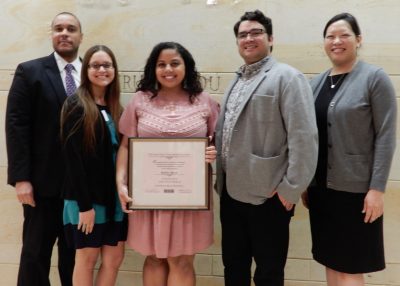
Isabella “Ivy” Horan ’19 (ED), a master’s student in elementary education, was recognized as the 30th Alma Exley Scholar at a reception in May at the Mark Twain House and Museum in Hartford, Conn.
Alexandra Lamb, a third-year doctoral student in educational leadership and a Dean’s Doctoral Scholar, was featured in the American Educational Research Association’s March issue of AERA SIG Educational Change. She also received the AERA’s Division A Foster Polite Award in April, which recognizes scholarly excellence in doctoral students who are members of Division A and enrolled in an educational administration, school leadership, or related program.
Kaitlin Leonard, Jess Monahan, Emily Tarconish, and Victoria Whaley, doctoral students in educational psychology, each gave presentations at the Badar-Kauffman Conference in Kent, Ohio, in April.
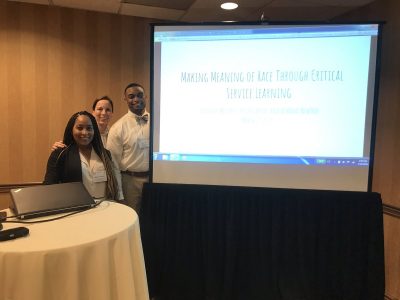
Ajhanai (AJ) Newton and Kolin Ebron, along with faculty Jennifer McGarry and Justin Evanovich, co-presented “Making Meaning of Race Through Critical Service Learning” at the Association of American Colleges & Universities Diversity, Equity, and Student Success Conference in Pittsburgh in March.
Megan O’Connor, a dual-degree senior in English and education, was recognized last month in Storrs at the Aetna Celebration of Student Writing with an Honorable Mention for her paper “Writing with a Pulse: Teaching for Radical Vulnerability.”
Alfredo Ramirez, a second-year student in the Higher Education and Students Affairs (HESA) graduate program, was profiled on the EDLR website.
Suli Serrano-Haynes, an English education student, received a UConn IDEA Grant. Her project, “Bridging the Gap: Empowering the Voices of Black Women in University Classrooms,” will examine Black female experiences as part of university-based classroom discussions. The goal is to participate in the greater conversation — supporting black women pursuing higher education — and provide university stakeholders with information to better serve students.
Emily Tarconish, a doctoral student in educational psychology, spoke about agrant project featuring videos on disability awareness and inclusive teachingat the “Teaching and Designing for Diverse Learners” conference at the University of Waterloo in Waterloo, Canada, in May. In addition, she is presenting at the 31st annual Postsecondary Disability Institute in Boston this month.
Brenna Turer, a HESA master’s student, was profiled on the EDLR website.
Alumni
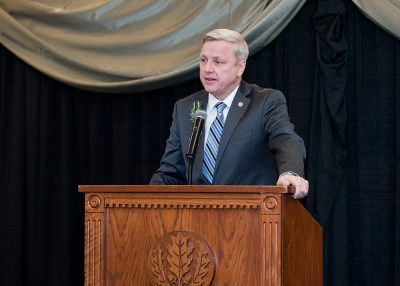
Alan Addley ’07 ELP, ’14 Ed.D., currently the superintendent of Granby (Conn.) Public Schools and the 2019 Connecticut Superintendent of the Year, who was recently featured in the Neag School’s “10 Questions” series, has been appointed superintendent of Darien (Conn.) Public Schools.
Emily Armstrong ’16 (ED), ’17 MA, a goalkeeper for the Icelandic soccer club IBV, was recognized by the U.S. Women’s National Soccer Team as No. 20 (out of 60) as a “goalkeeper to watch.”
Gordon Bernstein ’88 (ED) was nominated as Western Middle School’s “Principal of the Year” for Greenwich (Conn.) Public Schools. He will be formally honored at a ceremony in October.
Elizabeth Cole ’13 6th Year has been appointed assistant principal at Ellington (Conn.) High School.
Alanna Cooney ’17 (CLAS), ’18 MA presented “Compassion Fatigue Among Science and Mathematics Teachers: Investigating Climate Influences on Educator Burnout and Attrition” at an AERA Meeting Roundtable session in Toronto last month with John Settlage.
Jeffrey Corbishley ’07 (CLAS), ’08 MA was named Teacher of the Year for Ridgefield High School in Ridgefield, Conn., where he is the mathematics department chair.
Chris Dailey ’99 MA, a past Neag School of Education Outstanding Alumna award recipient and the assistant coach for UConn women’s basketball for the past 34 years, is being recognized with the Joe Lapchick Character Award. She will be honored at a luncheon in September in New York, N.Y. She was also recently inducted into the Assistant Coaches Hall of Fame.
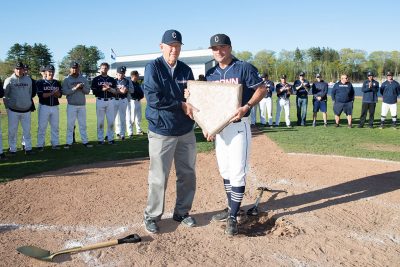
Alexandra Eckhardt ’11 (ED, SFA), a musician for the Broadway production of “The Band’s Visit” was profiled in the latest issue of UConn Magazine.
Lynda Mullaly Hunt ’88 (ED), ’97 MA, award-winning author of young-adult literature, published Shouting at the Rain (Penguin/Paulsen, 2019).Hunt was the Neag School’s Undergraduate Commencement speaker in 2017.
Michael D. Nash ’09 (CLAS), ’09 MA, ’18 6th Year has been appointed assistant principal at Ellington (Conn.) Middle and High Schools.
Jim Penders ’94 (CLAS), ’98 MA, coach for UConn baseball, was profiled in The Hartford Courant for closing in on UConn baseball’s all-time record for victories. UConn Today also featured him after he recently became the all-time winningest baseball coach in the program’s history.
Peter Scaramuzzo ’05 (ED), ’06 MA, as a featured speaker at the UConn Rainbow Center’s Out to Lunch Lecture Series on “LGBTQI Identit/ies as Educative Pedagogies Within Conservative Spaces” in April. He is currently a doctoral student at Texas A & M University in College Station, Texas.

Melissa Scarbrough ’15 (CLAS), ’16 MA, a French teacher at Ellington (Conn.) High School, organized a trip for her students to the UConn Storrs campus in collaboration with world languages education doctoral student Joey Dean and his junior students in world languages. The day included a trip to Downtown Storrs and a Mardi Gras mask-making session with the juniors on the Storrs campus. Check out photos from the visit.
Karen Skudlarek ’88 (BUS), ’16 MA was recognized as a 2018-19 First Year Experience Instructor of the Year. She is an educational technologist at UConn’s Center for Excellence in Teachers and Learning.
Tayarisha Stone-Batchelor ’17 Ed.D. who recently co-facilitated a PK-3 Leadership Program module at UConn Storrs, was featured on the EDLR website.
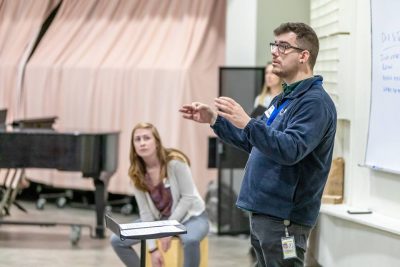
Rex Sturdevant ’17 (ED), ’18 MA visited the UConn Storrs campus in April with his fourth-and fifth-graders from Skinner Road Elementary School in Vernon, Conn. His students visited a music education class, and the junior music education students worked with the young artists, singing games, rehearsing the chorus’ songs for their upcoming concert, and reading of a book through singing. Check out photos from the visit.
Kevin Thompson ’13 Ph.D., an assistant professor-in-residence at UConn’s School of Business, was featured on the EDLR website.
Joshua Wilson ’13 Ph.D., an assistant professor in the University of Delaware’s School of Education, was profiled by the University of Delaware.
In Memoriam
Bruce E. Bradford ’65
Brian J. Burns ’63
Julieta Zapanta Castro
Richard R. Carella ’56
Dominic J. Dinino ’66
Robert J. Dowd ’50
Thomas A. Doyle ’56
Joyce (Person) Fox ’63
Helen W. Honoski ’63
Sylvia A. Illingworth ‘63
Stanley J. Kosloski ’71
Raymond A. Kozak ’78
John F. “Coach” Lambert ’65
Lila P. Orcutt ’51
Leo D. Porcello ’78
Kendall R. Richardson ’59
Alan J. Schwartz ’57
Joan H. Scranton ’68
Susan E. Taraschuk ’74
Raymond F. Walsh ’57
Wayne H. Westerman ’71
Richard W. Whinfield ’69
Robert A. Yawin ’72
Julieta R. Zapanta ’63
10 Questions With Two Educator Alumni Visiting Campus
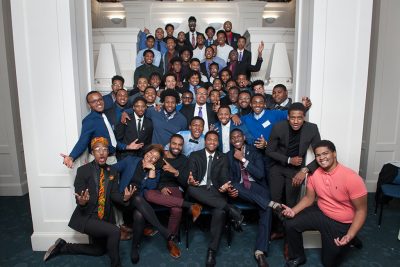
In our recurring 10 Questions series, the Neag School catches up with students, alumni, faculty, and others throughout the year to offer a glimpse into their Neag School experience and their current career, research, or community activities.
Neag School alumni Jamie S. Baker ’03 (ED), ’04 MA, and Ronall L. Cannada ’05 (ED), ’06 MA visited the UConn Storrs campus this past spring to attend the inaugural 2019 Black History Month Networking Night, held to connect students from UConn’s ScHOLA2RS House, led by the Neag School’s Erik Hines, with alumni and friends of the University.
Baker, invited by her nephew Darcus Henry, a ScHOLA2RS House resident recently accepted into the Neag School’s program for elementary education, is assistant principal at Ross/Woodward School in New Haven, Conn. Cannada serves as a social studies teacher and Positive Behavior Interventions System coach at CREC Great Hartford Academy of the Arts High School in Hartford, Conn. He is also the Black Males Achieving Education Leadership and Service (B-M.A.L.E.S.) facilitator at Greater Hartford Academy of the Arts.
They each reflect here on the impact of the event, as well as on their careers in education since graduating from the Neag School.
“During my tenure at UConn … I would enter many classes, and on a number of occasions be the only African American student in sight.”
— Jamie S. Baker ’03 (ED), ’04 MA
Where is your hometown?
JB: New Haven, Conn.
RC: Hartford, Conn.
What kind of impact did the ScHOLA2RS House Black History Month event have on you?
JB: Standing in a sea of young black men on the very same campus where I began my educational career two decades ago … left me with feelings of pride and a sense of camaraderie. The event reinvigorated me to begin to redefine my professional career and networks. The profound group of panelists provided the young scholars … with insight, raw experiences, and a sense of pride and encouragement. My nephew was transitioning into a young man with integrity and pride under the leadership of, and the tools provided by, those connected to the ScHOLA2RS House initiative.
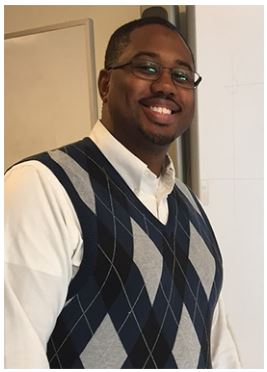
RC: I [am] a program facilitator of a black male scholars program at the K-12 level. … I am inspired to implement a pipeline approach for young men of color in which self-efficacy is increased [after] attending ScHOLA2RS House and Neag School events. Young men of color thriving on a college campus can become agents of change with outreach to K-12 systems that struggle to display models of success from underserved communities. Students that reach back and teach others about their successful transition at an institution of higher education will provide inspiration for younger male students. For example, currently two of the current ScHOLA2RS House Black History program attendees were my past students at the CREC Academy of Aerospace and Engineering. I look forward to our upcoming symposium event with these young men as they continue to blossom in leadership roles.
From your perspective, why is ScHOLA2RS Houseimportant for our young men of color?
JB: During my tenure at UConn, the number of people of color was insanely low. I would enter many classes, and on a number of occasions be the only African American student in sight. Seeing young men of color at that stage of my educational career was a far-fetched idea. Although women of color have surpassed previous statistics, I am grateful that our young men are beginning to make gains. From what I am able to ascertain from discussions with my nephew, the ScHOLA2RS House initiative provides the encouragement, structures, and confidence for our young men of color to join and gain the tools for completion. In my eyes, this work is instrumental in helping break the social and racial barriers needed to elevate the level of access to educational success for our young men of color.
RC: As an educator, I believe any program that will increase the self-efficacy in higher education of young men of color is important, because higher education is a critical factor in today’s economy and social mobility of men. ScHOLA2RS House is creating a legacy of success for young men of color that will become the standard for the next generation of upcoming UConn students. Furthermore, the ScHOLA2RS House graduates will inspire others with their successful transition at a predominantly white institution of higher education.
Hines is furthering the vision of impactful Neag School pedagogy by providing practical and academic wisdom to the current UConn generation. It was quite apparent from the [Black History] event that Hines is succeeding at displaying the beauty and dignity of scholarly excellence. I believe his work can be categorized as an epitome of a well-rounded educational program that ensures academic success, character building, and fostering brotherhood.
What motivated you to become an educator?
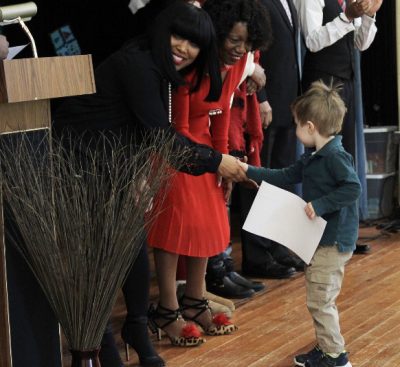
JB: Initially, I was going for a degree in nursing. After an internship at Yale New Haven Hospital during my junior and senior year, I quickly came to the realization that helping people was the desire, but not in the field of health. Through research and experience, I realized that teaching would be just as suitable to meet my ultimate fulfillment. Once I began with my fieldwork during high school and upon acceptance to the Neag School, I felt like teaching was innate. Teaching gave me a platform to give “miniature adults” something that would forever belong to them — education!
RC: I wanted to provide leadership in education to help the next generation of students of color to receive high-quality education as they developed into future leaders of America. As a CREC open-choice student who was bused out of the inner city, I knew that the opportunities in education for many were lacking and wanted to contribute solutions for urban education.
What makes for a strong educator in today’s schools?
JB: Thinking of the current state of education, an educator must have passion. No longer can people look at teaching as a secure job with summers off. One must have passion that brings forth resilience, sensitivity to your audience, flexibility, and a will for continuous learning. As stated by Fredrick Douglas, “It is not light we need, but fire … not the gentle shower, but thunder. We need the storm, the whirlwind, and the earthquake.”We need those with the will to put in the demanding work of educating “miniature adults” with unyielding, seam-bursting passion that renders the desired results.
I would be remiss if I did not mention the formal training that is aligned to the new generation of learners. Without education programs that prepare new educators, many teachers will not make it through the first couple of years of teaching.
RC: Strong educators form strong relationships with their students and show that they care about them as people. Strong educators are also knowledgeable about their subject matter and are able to facilitate high levels of academic success through differentiation for all levels of abilities in the classroom.
“As an educator, I believe any program that will increase the self-efficacy in higher education of young men of color is important, because higher education is a critical factor in today’s economy and social mobility of men. ScHOLA2RS House is creating a legacy of success for young men of color that will become the standard for the next generation of upcoming UConn students.”
— Ronall L. Cannada ’05 (ED), ’06 MA
How did earning your degrees at the Neag School help your professional career?
JB: Prior to holding a position, I can recall interviewing with groups of people. When engaging in dialogue regarding pedagogy as well as experience in execution of learned theories, I almost instantly felt a boost of confidence upon the realization that the preparation from the Neag School of Education far surpassed those of schools up and down the coast. At times, I could recall mentioning the program I graduated from and eyes in the room would light up during interviews.
The passion coupled with theoretical knowledge and practice gave me great stamina and insight as a new educator. This resulted in recognition from supervisors and opportunities to lead and participate in district initiatives that have thrusted my career forward quite quickly.
RC: The Neag School of Education has a great reputation for excellence in the New England region, which made the job search easy because we were well prepared and highly sought after by school districts.
What are three words you would use to describe your UConn experience?
JB: Three words that I would use to describe my college experience would have to be transformative, stimulating, and inspiring. Transformative is indicative of my forced transformation from young adulthood to a defined adult. Growing up, I believe that my parents protected me from some of the realities of life. I knew the world brought forth challenges that forced growth, but I did not realize the harshness and hurt that would be in the winds of these growing pains. However, these experiences helped build my emotional intellect. I learned to read people and their intentions in a way that did not disrupt my drive to meet success by any means. I learned to adapt and shift when in certain environments. Overall, the environment at UConn was one of the most intellectually stimulating institutes that I have experienced. I walked away with a renewed level of confidence as well as inspiration to prove to the world that success is mine.
RC: Passionate, unforgettable, grateful.
What is one thing that most people perhaps don’t know about you, but that you believe gives you a valuable perspective as an educator?
JB: The struggles that I have had in life growing up in the depths of a city divided between the wealthy and poor by a matter of blocks has allowed me to see a multitude of perspectives and have an appreciation for all.
RC: People don’t realize how much of an introvert I really am because when you’re an educator, the show starts as soon as the students enter the room. My classes are highly energetic and engaging for students, as I try to incorporate popular culture and trends to spark interest in U.S history. However, as soon as students are not present, I’m back to my introverted self; this trait gives me a lot of room for introspection of my pedagogy.
What is your proudest career achievement?
JB: During my second year of teaching, I was promoted as a lead person on a reading initiative, which lead me to train around the nation and turnkey the information to help implement the literacy initiative in the district.
RC: My proudest career achievement was when I was hired to teach U.S history at CREC as an alumnus of the project concern program. In that program, I [had been] bused out of Hartford as a youth to a suburban district for 12 years, and the experience gave me the inspiration to give back and teach, to raise the academic standards in urban settings. Now as a professional educator, I believe that my career has come full circle … I am able to impact change in the exact way I envisioned as a senior in high school.
What is your favorite piece of advice that you have received over the course of your career?
JB: A perfectionist is slow to reach the finish line; get perfection from the work of the team, not you as the individual.
RC: Look for small wins that demonstrate you are having impact on one student in every class. Often, being an educator is overwhelming emotionally because you wonder if you are making an impact. Yet, by looking at one student every class to gauge impact, I believe that I am seeing the fruit of my hard work each and every class I teach.
Check out more information about ScHOLA2RS House. View photos from the Black History Month event.
‘We Are All Dreamers’: Neag School Celebrates the Class of 2019

Commencement Weekend kicked off for the Neag School with a celebration for the graduates of the Higher Education and Student Affairs (HESA) program on Friday, May 10, followed by a special pre-ceremony reception at the Student Union on Saturday, May 11, for all Neag School master’s and sixth-year graduates completing advanced degrees in such disciplines as school psychology, school counseling, school administration, and teacher education. The beautiful weather offered graduates and their guests plenty of opportunities for fun photos with Jonathan the Husky mascot and a chance to connect with their faculty mentors and fellow students.
On Mother’s Day, Sunday, May 12, 148 undergraduates celebrated their Commencement at the Jorgensen Center for the Performing Arts. Associate Professor Alan Marcus served as lead faculty marshal, joining Jonathans XIII and XIV in leading the undergraduate student procession from the Gentry building to Jorgensen during a pause in the day’s rain showers. At Jorgensen, family members and guests watched a livestream of the student procession to the tunes of the “Rocky” theme and of “Eye of the Tiger.”
‘We Need Leaders With Courage and Charisma’
Featured as the Neag School keynote Commencement speaker was Karissa Niehoff ’10 Ed.D., the first female executive director of the National Federation of State High School Associations, which reaches more than 19,000 high schools across the U.S. and 12 million participants in high school activity programs.
Niehoff is an alumna of the Neag School’s educational leadership doctoral program, a 2016 recipient of the Neag School Alumni Board’s Distinguished Alumna Award, and has served as a physical education instructor, athletic director, assistant principal, principal, and as a coach at the high school level for five different sports.
“It’s terrific that we are honoring both education and sport management graduates at the same time, as I believe academic learning and sports education truly complement one another,” she said.
She went on to advise the Class of 2019 to listen to themselves, to continue deepening their education throughout life, and to seek opportunities for leadership. “More than ever,” she said, “We need leaders with courage and charisma; leaders who create a culture of growth, engage hearts and minds, capture collective intelligence and talent, and inspire others to shape new pathways toward success.”
Check out additional 2019 Neag School Undergraduate Commencement photos, as well as photos from the Commencement reception held for the Neag School’s master’s and sixth-year graduates, on the Neag School Facebook page.
‘We Are All Dreamers’
Jesús Cortés-Sanchez ’18 (ED), ’19 MA, who had received his Neag School master’s degree in music education at Gampel Pavilion the previous day, shared his powerful personal story as an undocumented student and aspiring music teacher.
“I want to change lives through the gift of music,” he said to cheers from the crowd. “I am not the only Dreamer in this space. The truth is that you and I — we are all dreamers, no matter where we come from, or what our legal status, gender, religion, race, or ethnicity may be. We are all dreamers who dream of a better society – and who have the power with our education to make a huge impact and break down any walls that are put in our way.”
Cortés-Sanchez will begin his first year as a music teacher this fall in West Hartford (Conn.) Public Schools.
Following his address, the Neag School’s Class of 2019 music education majors, who had sung the national anthem at the start of the ceremony, joined him in a moving performance of “A Million Dreams,” complete with acoustic guitars, keyboard, Cajón box drum, and ukuleles. Cara Bernard, assistant clinical professor, led the group.
After Vice Provost for Academic Operations Jeffrey Shoulson conferred the undergraduates’ degrees and the recessional was complete, a reception held afterward at the Student Union offered graduates and their families shelter from the rain, but also a free photo booth, photo ops with Jonathan the Husky mascot, and refreshments.
Monday evening’s Doctoral Commencement ceremony, also held at Jorgensen, featured as its keynote speaker Sandra Chafouleas, Board of Trustees Distinguished Professor of Educational Psychology from the Neag School. A mentor to many graduate students and postdoctoral scholars, an expert in her field, and the co-director of UConn’s Collaboratory for School and Child Health, Chafouleas was recently honored as the recipient of the 2019 Edward C. Marth Mentorship Award, which recognizes outstanding leadership and dedication to excellence in mentoring graduate students.
Related Stories:
- Featuring the Neag School Class of 2019
- Video: Music Education Majors and Jesús Cortés-Sanchez ’18 (ED), ’19 Perform “A Million Dreams”
- Photo Albums: Neag School 2019 Commencement Ceremony (Part I, Part II, and Photo Booth)
- Photo Albums: Neag School 2019 Graduate Student Reception and Photo Booth
AUDIO: Understanding How Creativity Develops
Edspresso (Ronald Beghetto featured in Australian podcast episode)
Penders Becomes Winningest Baseball Coach in School History
UConn Today (Neag School alum Jim Penders featured)
PBIS Academy, Mass. Schools Renew Partnership to Meet Needs of Students

For the past four years, the Northeast Positive Behavioral Interventions and Supports (PBIS) Academy, an evidence-based professional development program in the area of social-emotional development, has been used across the state of Massachusetts. Administered by the Neag School of Education through its affiliation with the Northeast PBIS (NEPBIS) Network, a loose affiliation of state education leaders in the Northeast, the PBIS Academy has announced it will continue its partnership with Massachusetts through the spring of 2022, after a bid to renew its contract for four additional years was recently approved.
The Academy, developed in 2014 with the Massachusetts Department of Elementary and Secondary Education (DESE) and UConn’s Center for Behavioral Education and Research, is the longest-running academy in Massachusetts and has earned nearly $4 million in total funding. It provides training to schoolwide leadership teams and coaches, as well as a multi-tiered system of supports (MTSS) to meet the academic, social, and behavioral needs of all students.
In implementing the program, the DESE prioritizes those schools that are performing in the lowest 20% of schools statewide, and that demonstrate readiness not only to establish a representative PBIS leadership team and internal coaches, but also to ensure participation and support from school administrators and staff.
Adam Feinberg, NEPBIS Network director and assistant research professor at the Neag School, works with three other Neag School faculty, Brandi Simonsen, Jennnifer Freeman,and Susannah Everett, to coordinate the NEPBIS Network. Each has professional training and experience in implementing MTSS at regional and national levels.
“MTSS is a framework which helps organize how schools really identify and support systems that support staff, data that supports decision making, and practices that support students across a three-tier prevention model,” says Feinberg.
“One of our middle school teams has been incredibly successful and just keeps building and building. It has really gone beyond our expectations.”
—Mary Ann Jackman, assistant superintendent, Weymouth (Mass.) Public Schools
The PBIS framework’s three-tier prevention model consists of the following:
- Tier I: Establishes cohesive behavioral expectations and a consistent application of positive reinforcement to improve overall school climate;
- Tier II: Helps schools develop systems to support students who are not responding to the universal practices due to social, emotional, or behavioral challenges, and need more focused attention;
- Tier III: Provides individualized and intensive interventions and support to students who are not responsive to the primary and secondary levels of prevention, in order to reduce problematic behaviors and improve life outcomes.
To support implementation of the PBIS framework, each school forms a team of six to eight representative staff members to participate in a three-year training program, with individual training days allocated to team training, coaches’ training, and on-site technical assistance. Two members of the PBIS team serve as coaches, or internal experts and facilitators who lead the school’s implementation of the PBIS framework. The technical assistance helps apply the training content to the individualized needs and priorities of each school.
Following the six days of training in the first year, teams meet for three days in the second year to assess implementation, deal with any issues that come along, and deep-dive into certain topics, such as classroom domain support and crisis response.
“The first year is the most intensive because the schools are really building their framework,” Feinberg says. “The focus is to develop products of their plan, send it out to staff for feedback and revisions, and then get ready for what will hopefully be an implementation year in Year Two.”
The third year consists of two training days that serve as a time to get routines down in the implementation process and share ideas with other participating schools through roundtable talks and a poster-sharing session.
“Teams really like the structure of the training because they get content, but then they really get a lot of time just to work on their product as a team,” says Feinberg. “They are also given tools to help them track their progress and help with data-based decision making.”
The PBIS Academy utilizes a yearly self-assessment, the Schoolwide PBIS Tiered Fidelity Inventory, and a PBIS Team Implementation Checklist, which schools complete two to three times a year to evaluate PBIS implementation in schools and create action plans to address areas that need improvement.
“The PBIS program has made our students aware of what the behavioral expectations are, and it has allowed us to be responsive to behavior before it becomes crisis behavior.”
— John Crocker, school mental health and behavioral services director, Methuen (Mass.) Public Schools
Methuen (Mass.) Public Schools began implementing the PBIS framework during the 2014-15 school year. John Crocker, director of school mental health and behavioral services at Methuen Public Schools, serves as the coordinator for the Methuen High School PBIS team and oversees all PBIS teams across the district. He says PBIS has allowed Methuen schools to identify behavioral problem areas and direct action plans to resolve those problems.
“I am really proud of how we use data,” Crocker says. “We are making data-driven decisions, and we are using data to support our aggregate-level needs and inform our intervention needs for groups and for individual students.”
Crocker also credits the PBIS program with the opportunity it has created for many more students to be recognized for what they do. Methuen Public Schools have established a “Ranger Pride” point system to reinforce positive behavior, a practice that personalizes the PBIS program to reflect the district’s community values and expectations.
“The PBIS program has made our students aware of what the behavioral expectations are, and it has allowed us to be responsive to behavior before it becomes crisis behavior,” says Crocker.
Weymouth (Mass.) Public Schools is a PBIS participant consisting of eight primary schools, two middle schools, and one high school. Mary Ann Jackman, assistant superintendent of Weymouth Public Schools, says Weymouth chose to implement PBIS because there was a need for a systematic support structure for social-emotional learning and student behavior, as well as a need for continuity across the district.
“The PBIS team members are very excited to be a part of the teams and have, for the most part, been consistent throughout,” Jackman says. “One of our middle school teams has been incredibly successful and just keeps building and building. It has really gone beyond our expectations.”
The next step for Weymouth is to utilize the teams of teacher-leaders to introduce social-emotional learning into the PBIS framework and to launch a full, sustainable implementation of PBIS at the seventh- to 12th-grade levels, says Jackman.
As for the PBIS Academy, Feinberg identifies three major goals for the program moving forward:
- Help schools more quickly set up systems to look at data so that they are able to track outcomes and look at data more effectively;
- Draw more attention to culturally responsive practices so that schools can locate disproportionality much quicker and work toward fostering equity across the school;
- Build easy ways to support district management so that district administrators are able to direct PBIS after the three-year training and sustain the positive impacts.
“Schools report a general overall improvement of school climate and much more prosocial behavior since implementing PBIS,” says Feinberg. “Routines across the school are better understood by staff and students, which makes the flow of the day a much more positive experience.”
Isabella Horan Honored As 2019 Alma Exley Scholar
Alma Exley Scholarship (Isabella “Ivy” Horan was honored as the 30th Alma Exley Scholar)
Everyday Creativity
Rice Magazine (James Kaufman is profiled about his work in creativity)
Response: ‘Games Absolutely Have a Role in Teaching and Learning!’
Education Week (Michael Young is interviewed about the impact of games and learning)
